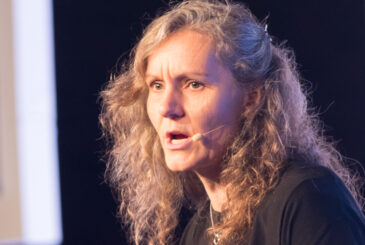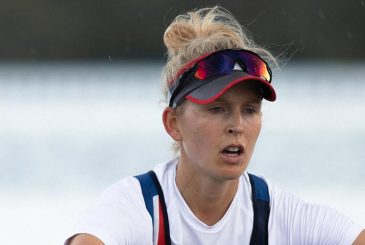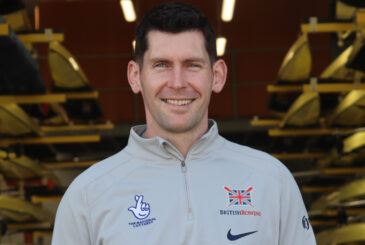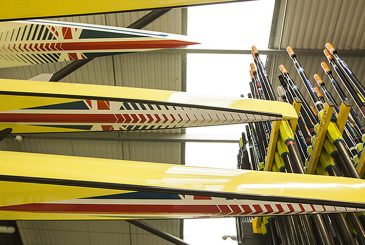Back in February, Andrew Randell was appointed GBRT Women’s Olympic Head Coach. Martin Gough caught up with him as the women’s squad prepared for World Cup 1 from 27-29 May
Great Britain’s women go into the opening World Cup regatta of the season with a new Olympic Head Coach at the helm. This weekend will be a first chance to find out whether Australian Andrew Randell is on the right track to achieving his goal of a world championship medal at the end of the season.
Randell moved to the UK at the beginning of February to take on the role of women’s Olympic head coach after a worldwide search was launched.
“I don’t expect to keep my job if I don’t win medals,” he says frankly.
“If we can win a medal somewhere this year, from the lightweight women or sweepers or scullers then that would be great.

“We’ve set our Paris [2024 Olympic] medal targets but there are other targets too – the non-tangibles; the culture, the feel, the longevity of the programme and whether we can keep athletes for three or four cycles. They’re all important measures as well.”
Randell’s international coaching pedigree goes all the way back to 1995, when he first started working with Australian national crews, and it includes Olympic Games in 2008, 2016 and 2021. In Tokyo, he led the Aussie women’s quad to a bronze medal having first made it through the qualifying regatta.
He began rowing at the age of 12, sent to boarding school in Perth from Papua New Guinea, where his parents worked and where he grew up. His career highlight as a rower, he says, was being part of the 1987 Australian lightweight eight, which finished seventh in the world.
“We didn’t do too well but we had a great tour in Switzerland, training before the World Championships,” says Randell.
“I was never really great. I was only selected when there was a big team, which was unfortunate for me but probably where my physical ability was.
“I never won too many medals but that probably kept my hunger going and made me a better coach. I think you might find that with a few coaches, who never quite fulfil their destiny as athletes and get enthusiastic to coach.”
Post-rowing, he studied for a PhD in bone osteoporosis, and began coaching when Sydney Grammar School offered to fund his studies while he coached them.
His coaching experience ranges from women’s Olympic crews to schoolboy eights. His first success in the UK came with the King’s School, Parramatta, who won the Princess Elizabeth Challenge Cup at Henley in 2001.
Randell is bringing a southern hemisphere method to his training
Now he is a new broom for the GB women, making sweeping changes. “In one sense I’m very lucky that the girls are keen for change.”
Randell’s coaching philosophy starts with what he calls the “NTRs” – elements for which No Talent is Required.
He explains: “They are things like training hard, being on time, asking yourself the right questions. If we get those things right, you have a positive training environment and the trust and professionalism come on the back of that.
“I try to keep the technical messages really clear as well, so there’s no doubt what we’re trying to do: we’re trying to row long, to load off the footplate rather than upstairs in the shoulders and we want it to be together.
“Then I keep it very simple and try to be consistent and transparent with the message.”
Randell is bringing a southern hemisphere method to his training.
“The big issue we’ve had is with Covid – we’ve had seven with it in the last two months”
“I don’t know the British way, I’m not from that system. I can see big differences with the system I’m from and I can see the similarities too,” he says.
“We’ve had European coaches with – I think you call it – ‘UT2, UT1 and threshold’. But the Aussies and the Kiwis have moved away from that.
“We row on speeds much more and have done over the last 15 or 20 years. We do a lot more long intensity work and the recovery is in the rate. If it’s rate 20, it’s as hard as you can pull at rate 20.
“It’s challenging for the girls here to move to that philosophy, but it teaches you to row long because if you’re at rate 20 at max pressure, the only way you can get the target speed is by rowing long and driving hard down low.
“But the feeling they’re getting at rate 20 is very similar to that at rate 36. In fact, sometimes it feels lighter at 36 because all you do is shorten the recovery.
“It’s pretty relentlessly hard; it’s difficult to get a balance, but it has got a lot of results.”
The reaction from the GB women, he insists, has been good, and results have been obvious already.
“They’ve been very positive; they want to do something different. The ones that did senior trials did really well. We had 11 doing [2k ergo tests], with nine PBs, which is hard to do with a senior group. The two who didn’t PB were only fractions off.
“That helps because it gives you direct feedback that the programme is working.”
A 13-strong women’s squad will represent GB at World Rowing Cup I in Belgrade, Serbia from 27–29 May, but that is likely to be just a first draft, after a winter hit by illness.
“The big issue we’ve had is with Covid – we’ve had seven with it in the last two months,” says Randell. “When you have a squad of 21, seven out is a bit of an issue. We’ve had one or two other things and all of a sudden you’ve lost half your squad.
“But I’m really pleased at the way the girls have handled that and not lost the momentum. We have people who have really focused hard on getting back.”
Success on the water is not the only thing governing the length of Randell’s tenure with the Great Britain team.
His family has moved to the UK. Wife Vicky Spencer, who is also a successful coach at school and age-group international level, is originally from Kent, although he jokes: “She says she left for good reason 20 years ago!”
When we speak, his daughters, aged eight and six, have just completed a successful first day at school near their home in the Thames Valley.
“If the family is happy then I daresay I’ll stay for two or three Olympics,” he says.
“I’d like to have an impact. I’m hopeful that we win plenty of medals over the next couple of world championships and the Olympics, and I would certainly like to stay on after that, but I haven’t really thought much about the long term.”









